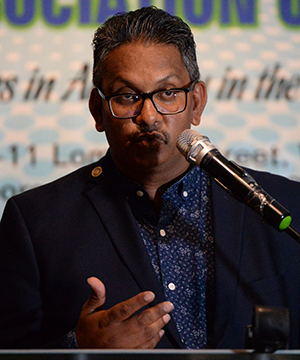–to make room for anchorage when oil & gas kicks in
THE Maritime Administration (MARAD) is seeking to remove whatever wreckage there is in the country’s many waterways, particularly the Demerara River, its main seaport.
According to Director-General Claudette Rogers, pressure is now mounting on the local maritime industry, since it is expected that there will be an increase in maritime traffic, given the imminent emergence of an oil-and-gas sector here.
“It becomes of importance that we seek to have [the wreckages] removed in the not-too-distant future.”

In the Demerara River, the main waterway for commercial maritime traffic, there are wreckages that need to be removed urgently, Rogers said: “The area where those wrecks are, I’m advised, can be areas that we may be able to use for anchorage.”
The one problem, however, is what it would cost to do such a job, and whether the company assigned to do it has the capacity to handle it.
Recently, Secretary of the Private Sector Commission, Komal Singh, highlighted that these wreckages are a bugbear within the maritime sector.
Singh, who is also Chief Executive Officer (CEO) of GAICO Construction and General Services Incorporated; this company has the capacity to salvage wrecks and tow vessels in the river and Singh is contending that while attention might be on how to safeguard from oil spills from the offshore drilling of oil, focus should be placed on oil spillages that threaten Guyana’s waterways because of accidents that may occur due to the presence of these wrecks.
Singh explained that presently, fuel and heavy oils used by sea-going vessels are being transported in single-hull vessels, and that should they collide with one of the wrecks, that could pose a real threat.
“Imagine if, one day, one of those vessels loses power, runs into one of those wrecks and we have a thousand barrels of fuel oil spill in our waterway,” he said.
And, given the speed at which the river flows, and the tide that may be present, Singh hinted somewhat darkly that it could very well result in a total shutdown of Port Georgetown, which will significantly hamper commercial activities.
As he went on to explain, single-hull vessels have only one outer, water-tight layer which runs throughout the structure of the ship. As such, these types of vessels are more prone to marine pollution during collision, grounding, and any other form of the ship’s hull damage.
In light of the foregoing concerns he shared with the Guyana Chronicle, Singh said: “We have already started with MARAD and the Environmental Protection Agency (EPA) to have a system in place to get rid of single-hull vessels to transport fuel in waterways.”
According to MARAD’s Ms Rogers, regulations would have to be amended to prohibit the use of single-hull vessels, but this would not be done without first sensitising shipowners.
Another point of focus, according to Singh, is that shipowners need to ensure that they have adequate insurance coverage for their vessels.
“We have a lot of wreckage in our waterways,” he said. “And because of poor insurance coverage, those wreckages are being left in our waterways for MARAD and the Government of Guyana to take taxpayers’ hard-earned money to go and salvage those vessels. And I don’t think it is fair.”
He further noted that in the event of a mishap, the insurance company would at least be able to assist in salvaging the wreckages.



.jpg)




![Ship1 MARAD Director-General Claudette Rogers [Photo courtesy DemWaves]](https://guyanachronicle.com/wp-content/uploads/elementor/thumbs/Ship1-o0laykdy3br795p1ywmc2celhvec6hw0ua7xtft69a.jpg)





